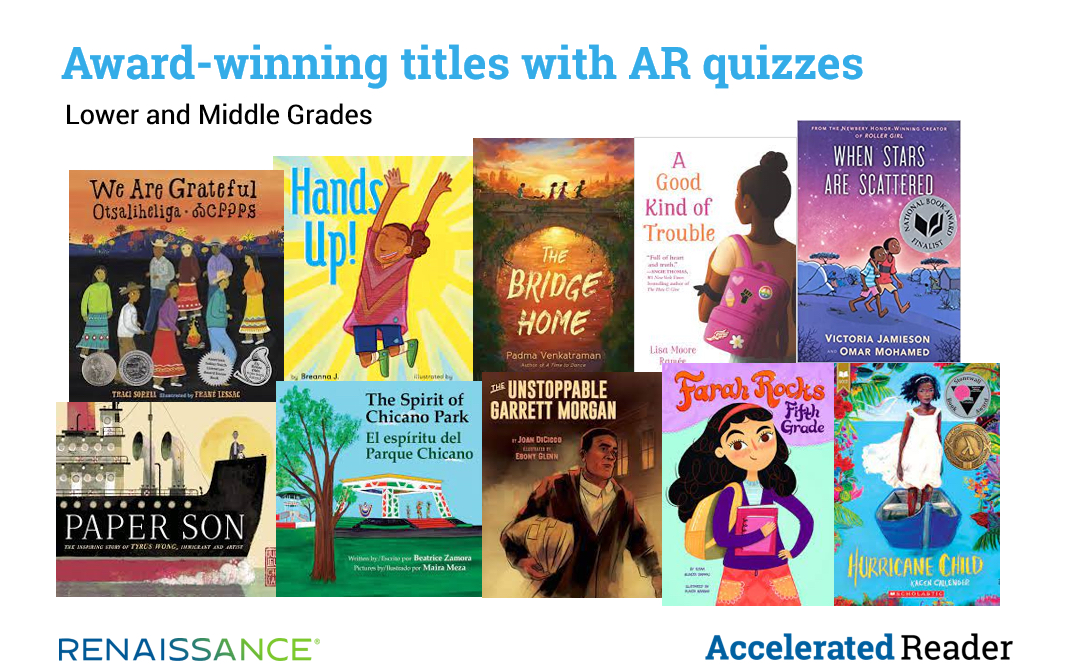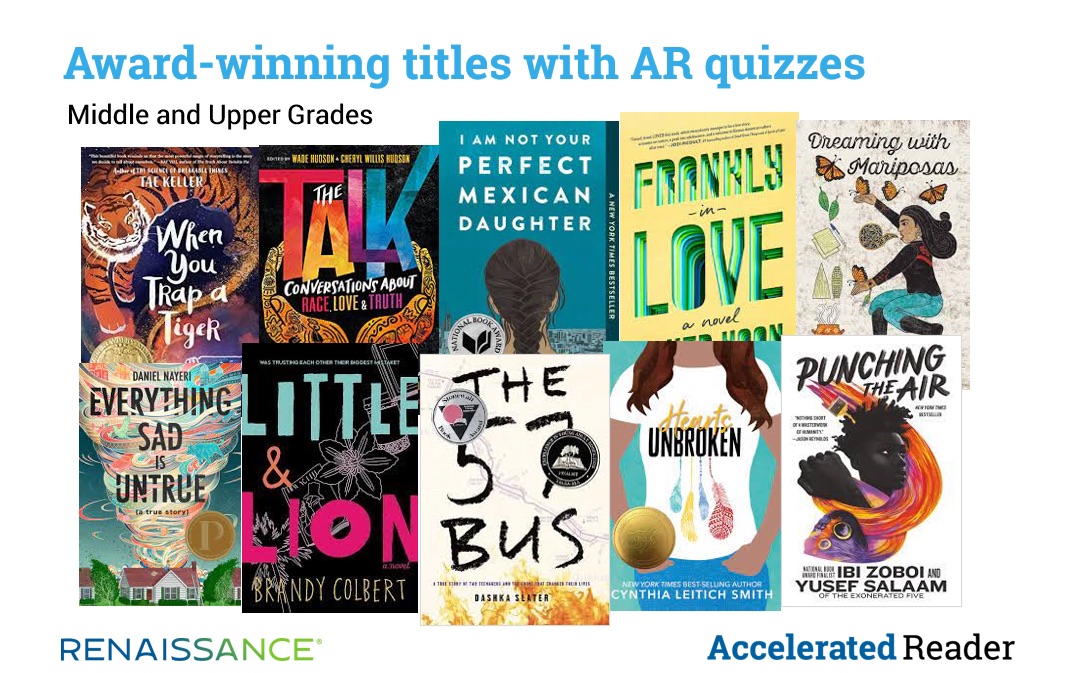November 5, 2021
As we celebrate 35 years of Accelerated Reader, we recognize the importance of not only honoring the past but also looking ahead to the future. In this blog, we’ll answer some of the most common questions about how books are selected for new Accelerated Reader quizzes. We’ll also describe our initiatives to ensure that AR continues to provide every student with a wide range of options to support independent reading practice.
We’d like to thank the following members of the Renaissance Content Team for sharing their expertise with us: Lynnette Kopetsky (Content Curator), Carolyn Tarpey (Content Curator), Sara Cisar (Publisher Programs & Curation—Supervisor), Frank Delbovi (Content Designer), Kristi Holck (Manager, Content Design), and Dr. Chastity McFarlan (Content Quality Manager).
What does the team consider when selecting books for Accelerated Reader quizzes?
Our focus when choosing titles is always the students who will be taking the AR quizzes. We want to make sure that we’re selecting books that meet the needs of students and schools across the country, from kindergarten through high school.
We select and prioritize books based on a variety of factors. Popularity with students is obviously one consideration. For example, we know that when a new book is published in a popular series—such as Diary of a Wimpy Kid or I Survived—there will be an immediate demand for the AR quiz. We also receive thousands of online requests each year from our end-users: teachers, librarians, parents, and even from students themselves.
Another focus when choosing titles is Diversity and Inclusion. Our goal is to select books that portray characters of differing cultures, races, ethnicities, sexual orientations, gender identities, abilities, and religions. To that end, we seek out books with diverse characters and settings. We want to ensure that students are able to choose books that reflect their lives and experiences—and help them to better understand other people’s lives and experiences, too.
How specifically do you seek out books with diverse characters and settings?
In some ways, the processes we follow for general book selection also apply to our Diversity and Inclusion initiatives. For example, we read reviews of new children’s and young adult (YA) books; we form relationships with both trade and school library publishers so that we receive advance notice of upcoming releases; and we review the many suggestions we receive from educators, families, and students, as mentioned above.
Another major source of titles is awards lists that focus on Diversity and Inclusion. Currently, our list contains 25 awards, including the Stonewall Book Awards, which recognize books that reflect LGBTQ+ experiences, and the Coretta Scott King Book Awards, which recognize children’s and YA books that reflect African-American experiences. Both of these awards are sponsored by the American Library Association.
Another award is the Walter Dean Myers Award for Outstanding Children’s Literature—also known as The Walter Awards. This award recognizes “diverse authors whose works feature diverse main characters and address diversity in a meaningful way.” We have Accelerated Reader quizzes for the 18 winning and honoree titles from 2019–2021, including When Stars Are Scattered by Victoria Jamieson.
Frank D., the Content Designer who created the AR quiz for When Stars Are Scattered, has this to say about the book:
“This is a graphic novel about a Somali boy and his brother, their life in a refugee camp, and his dreams of getting an education and becoming a social worker. The story, which is true, takes place in a refugee camp in Kenya. Eventually, the protagonist, Omar, and his brother make their way to the US. An afterword reveals that they are now US citizens, and that Omar is a social worker and is married to a fellow refugee who also found asylum in the US.
The book is topical and deals with an underrepresented group—African asylum seekers, most of whom languish in refugee camps but some of whom make it to other parts of the world. Enough have come to the US that there are now communities in various US cities, particularly communities of Somali immigrants. There’s one in Minneapolis, for example. These folks are having children and raising them in the US. It’s good for those children to read about where their parents are from and how they arrived in the US, isn’t it?”
In addition to winning the Walter Award, When Stars Are Scattered was a National Book Award Finalist, a Jane Addams Children’s Book Award Finalist, a New York Times Book Review Notable Children’s Book, and a Time Best Book of the Year, among other honors.

Once you’ve identified a book, does it have to meet certain criteria in order for an AR quiz to be written?
Yes. There’s sometimes a misconception that the members of the Curation Team operate like book critics, and that we only select books that appeal to us personally or that we’d describe as our favorites. Our criteria are actually much less subjective.
First, the book must be quizzable, meaning that it has enough unique content for an AR quiz to accurately assess students’ reading comprehension (or their listening comprehension, in the case of books that are read aloud to them). Not every book meets this criterion. For example, think of a picture book that’s designed to teach colors to young children: the coat is yellow, the hat is red, the umbrella is blue, etc. A book like this doesn’t offer a lot of content, and potential quiz questions—What color was the coat? Which object was red? —would not be fair to students. Such questions wouldn’t assess children’s comprehension but rather their ability to remember the author’s arbitrary decisions about which color to assign to which object.
Reference books provide another example—including books that are otherwise promising from the perspective of Diversity and Inclusion. For example, imagine a middle-grades book titled 40 Famous Hispanic Americans or 50 Pioneering Women in STEM, where each person receives a one-page write-up. Because the individual entries are so brief and high-level, it can be difficult to identify enough unique information to assess a student’s comprehension of the entire text.
The second criterion is that factual information must be accurate. Clearly, this criterion applies to nonfiction (which is presented as factual) much more than to fiction (which is presented as the work of the author’s imagination). Like the quizzability criterion, it also applies to all topics, from astronomy to dinosaurs to music. But when nonfiction books focus on historically underrepresented people and groups, accuracy is critical. There have been instances where titles are initially selected for AR quizzes but are then rejected when the Content Designer reads the book and identifies significant inaccuracies.
To give one recent example, a nonfiction book about the Hmong people of Southeast Asia stated that they are from a region that’s also called Hmong. This is simply not accurate. We notified the publisher of this issue, and we explained that we would not be able to move forward with an AR quiz for this title.

Does this initiative also involve reviewing existing AR quizzes through the lens of Diversity and Inclusion?
Absolutely. Accelerated Reader offers quizzes on more than 200,000 titles, and several thousand new quizzes are added each year. In addition to writing these new quizzes, our Content Designers regularly review and refresh existing quizzes within the collection. In fact, our goal is to have them spend about 10 percent of their time on this.
An important part of the review process is confirming that all quiz questions and answer choices adhere to AR’s Content Appropriateness Guidelines, which require “treating individuals and topic areas with appropriate respect and not offending or otherwise impeding a student’s ability to respond to content due to personal characteristics, background, or other aspects that are not relevant to the content.” The guidelines also require quizzes to treat potentially controversial topics “with sensitivity and in a manner that is respectful to the reader.”
In some cases, the Content Designer identifies the need to revise a quiz question or an answer choice to better align with these guidelines. To give a few examples:
- Treating controversial topics with sensitivity: It’s not unusual for a mystery or crime novel to involve a murder or other violent act. But rather than asking students how the murder was committed—and then listing various gruesome alternatives—we’d instead ask why the murder was committed (which is also likely more relevant to the novel’s plot than the “how”).
- Using respectful, people-first language: Rather than using a condescending phrase such as “confined to a wheelchair,” we’d instead say that a character “uses a wheelchair.”
- Avoiding negative stereotypes: Imagine a middle-grades book in which a male character apologizes to a female classmate. If we ask why he apologized, we’d need to provide a list of plausible options for students to choose from: For telling a lie, reading messages on her phone, losing the book she’d loaned to him, etc. These are the distractors—answers that are incorrect but appear plausible to students who have not read the book. Here, we’d avoid using distractors that perpetuate negative stereotypes—such as For saying that girls are no good at baseball.
We’re sometimes asked how we ensure consistency in the review and revision process. To promote consistency, we hold regular norming sessions where the Content Designers—as a team—review and comment on quiz questions and answer choices that have been marked for revision. This helps to ensure that team members are interpreting the content guidelines in the same way and take a similar approach to this process.
Earlier, you mentioned a list of 25 awards that you use to seek out diverse titles for AR quizzes. Can you share the full list?
Absolutely. When selecting books for AR quizzes, we give special consideration to:
- American Indian Youth Literature Awards and honor titles
- BCALA Children & Young Adult Literary Awards
- Coretta Scott King Book Awards and honor titles
- John Steptoe Award for New Talent
- Pura Belpré Awards and honor titles
- Schneider Family Book Awards and honor titles
- Stonewall Book Awards and honor titles (especially the Mike Morgan & Larry Romans Children’s & Young Adult Literature Award)
- Américas Award, honorable mention and commended titles
- Arab American Book Awards for Children/Young Adults and honorable mention titles
- Asian/Pacific American Award for Literature and honor titles
- Carter G. Woodson Book Awards and honor titles
- Children’s Africana Book Awards and honor titles
- Ezra Jack Keats Awards and honor titles
- Freeman Book Awards, honorable mention, and of note titles
- Jane Addams Children’s Book Award
- Lambda Literary Award for Children/Young Adults and finalist titles
- Middle East Book Awards and honorable mention titles
- NAACP Image Awards for Outstanding Literary Work and nominees
- New Voices Award and honor titles
- Scholastic Asian Book Award and runner-up titles
- South Asia Book Awards, honor and highly commended titles
- Sydney Taylor Book Awards
- Tomás Rivera Mexican American Children’s Book Awards
- Walter Dean Myers Awards for Outstanding Children’s Literature and honor books
We currently have 86 percent AR quiz coverage of these awards from 2019–2021, and we are working to reach 100 percent coverage by the end of the year. Also, we are always seeking awards that meet our criteria to add to this list, and we would love to hear from our customers about additional awards we should include.
Looking for diverse titles to explore with your students this year? Check out What Kids Are Reading, the world’s largest annual survey of K–12 student reading habits. And to see everything that today’s Accelerated Reader has to offer, click the button below.

